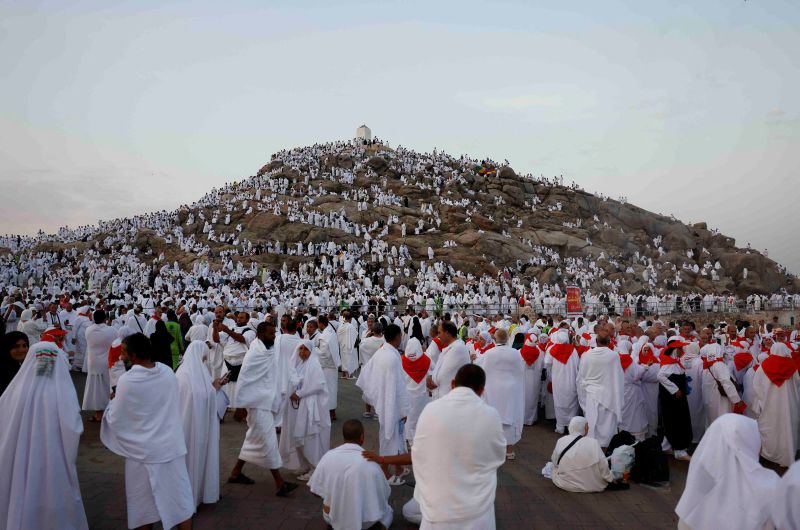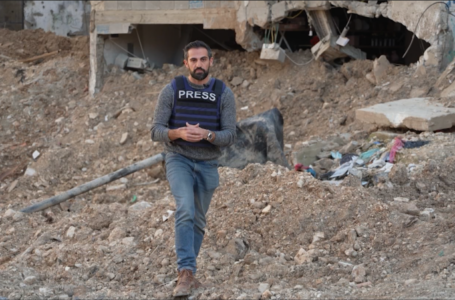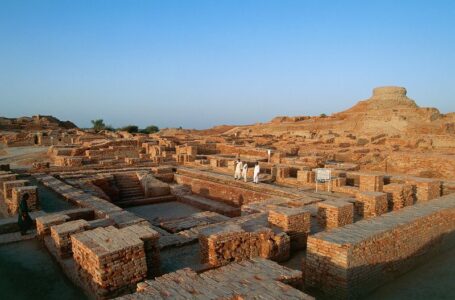Here’s what happened during President Donald Trump’s 6th week in office
‘We are happy he’s buried in Mecca,’ says daughter of man who died in Hajj heat wave


The family of an elderly Indonesian man who died during this year’s Hajj is happy he was buried in the holy city of Mecca, his daughter said, as the Southeast Asian nation mourns hundreds of its citizens who perished in extreme heat during the annual Islamic pilgrimage.
More than 1,300 people died on this year’s Hajj with “numerous cases” due to heat stress, according to Saudi Arabian authorities, after more than 1.8 million pilgrims took part despite temperatures soaring to dangerous levels. Authorities in Indonesia, the world’s most populous Muslim-majority country, said at least 215 Indonesians are among the dead.
“He was asleep and had no symptoms of sickness before. Everyone said he was healthy during the Hajj procession,” she said.
Sentono had registered for the Hajj in 2018 and traveled to Mecca with his 83-year-old wife and neighbors from the Indonesian city of Yogyakarta, Jumartiyah said.
“My father was very enthusiastic about going on the Hajj. He wanted to leave immediately,” she said.
Performing Hajj is one of the five pillars of Islam, which requires every Muslim who is physically and financially able to make the journey to the holy city of Mecca at least once in his or her life.
According to Islamic belief, to die and be buried in Mecca is considered to be a blessing, with many Muslims traveling in their old age after having saved for many years to make the pilgrimage.
“We are happy that he was buried in Mecca,” Jumartiyah said, adding that she hoped to visit her father’s grave when she eventually makes the pilgrimage.
Jumartiyah said her mother, Pariyem Prawirodinomo, is healthy and due to return to Indonesia on July 7.
Some 241,000 Indonesian pilgrims were scheduled to make the journey to Mecca this year, according to Indonesian officials – the country’s largest ever quota.
According to data from the Indonesian Ministry of Religious Affairs, most of the Indonesians who died on the pilgrimage this year were over age 50.
It is not uncommon for Indonesia to register hundreds of deaths during each year’s Hajj – last year, 773 people died during the pilgrimage, according to records from the ministry.
‘I saw many pilgrims who died’
Extreme heat has been named as a main factor behind the hundreds of deaths and injuries reported this year during the Hajj. Mecca, the holy city that is central for Hajj pilgrims, saw temperatures soar to a record 125 degrees Fahrenheit (51 Celsius) on Monday.
Various authorities have also said the problems have been compounded by the number of unofficial pilgrimages, with the Saudi government saying Sunday that “unauthorized” trips accounted for more than four out of five of the fatalities.
Saudi Arabia requires each pilgrim to acquire one of the 1.8 million available licenses to legally access Mecca. These licenses can cost several thousand US dollars. Unlicensed pilgrims typically don’t travel in organized tour buses with air conditioning or easy access to water and food supplies.
As part of the pilgrimage, the faithful perform a series of rituals in and around the holy city of Mecca, often involving many hours of walking in the scorching heat every day.
Some pilgrims have lamented the poor infrastructure and organization of this year’s Hajj. Even pilgrims on official tours spend the bulk of their day walking outdoors in the heat.
A 44-year-old Indonesian man who only wished to be referred to as Ahmad, recalled seeing many dying from the heat.
“Along the way home, I saw many pilgrims who died. Almost every few hundred meters, there was a body lying and covered with an ihrom (white fabric) cloth.”
“Every time there is a distribution of water from local residents or certain groups, it is immediately overrun by the pilgrims,” he added, saying that he didn’t see health workers or a single ambulance along the road.
In recent decades, the sheer size of Hajj crowds has been a factor in a number of deadly incidents during the pilgrimage, including a stampede that killed hundreds of people in 2015.
However, experts have warned that rising temperatures pose the deadliest threat to pilgrims as heat records tumble in the Middle East – one of the most vulnerable regions to the climate crisis – making mass gatherings riskier.
“Everybody is affected by deadly heat and sadly I am not surprised by (the Hajj) death toll,” he added.
“Spending time outdoors in the extreme Mecca heat is risking death … so I am afraid there will be more deadly Hajj pilgrimages in the future.”











